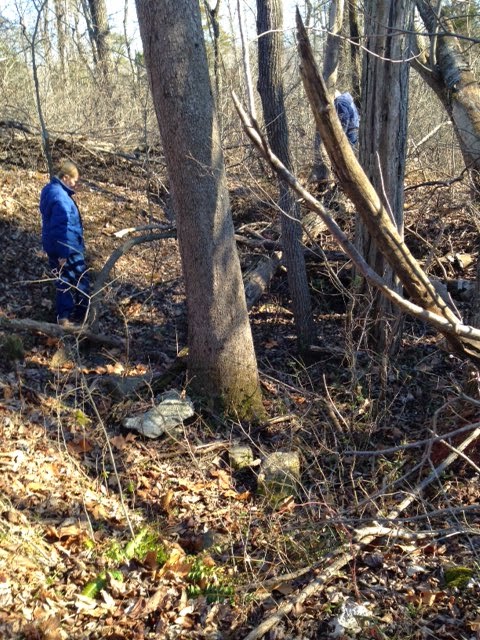Genealogy is fun because when you solve one mystery, one or two more takes its place. And that is what happened this week when two Stafford County
historians visited us so we could show them what we believe is the site of the
John England (1755-1851) homestead.
 |
| Exploring the root cellar of England house site |
They were delighted to see the well and then the depression where the
two room ~18 x 29 foot frame house stood. The depression indicated this house
had a root cellar. The front door stone was located, and position of walls was
determined. An essay by an England family descendant mentioned the 2 x 2 ft rose
quartz stones used for the foundation, and indeed those stones were found.
 |
| Stafford Historian Jerrilynn Eby MacGregor documenting terraces |
“You just made my day,” she exclaimed. There
in plain sight, though previously missed by us, were terraces cascading down
the hill towards the river. “Keeper of the knowledge” for Stafford County,
Jerrilynn Eby MacGregor and her husband Rick have been documenting terraces
found in Stafford County. She said this terrace would be either the 19th
or 20th found so far. She explained that terraces were in vogue in the early 1700s,
and so might predate the England family’s ownership of the property. First mystery of the day: She thought
she knew who owned the land during that time period, but who exactly built,
resided there and had enough money for slaves to build these terraces?
On to England Run where there are two dams
that have us stumped as to their use. The first possibility was a mill, though Jerrilynn couldn’t find enough evidence that one existed on
the only flat surface downstream.
To confuse things, the dam was made partially of concrete, an expense
not likely to be incurred for a family gristmill, which brought us to our second mystery.
We walked a fair ways to what we believe is
the England cemetery. A concern
was raised that the cemetery was located too far from the house. Jerrilynn told
us usually burials were just out the back door. And that whites and slaves
might very well be buried in the same location, though with some sort of
separation. We spent time shuffling leaves with our feet desperately looking
for some sign of a house – a depression, pile of bricks, etc. Nothing. We kept in mind that since the Union
soldiers had marched through this area 150 years ago, any rocks or bricks might
have been removed to build fire pits. Our third
mystery presented itself, and different scenarios were suggested. Maybe the
first male to die wanted to be buried on a high point overlooking the
river. Jerrilynn gave us a
homework assignment – in April we are to comb that area looking for
daffodils. If we find any, that
might be where a house once stood.
In the meantime, we are going back to the
drawing board regarding the England family, and the land on which their property
stood. Hopefully there will be
more to the story at a later date and that some of these mysteries will be
solved.
No comments:
Post a Comment